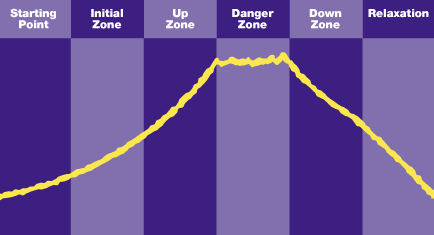A problem drinker could be described as emotionally supercharged. Her/his emotions swing from deep remorse to a highly emotional state which leaves her/him continually confused. They are always on guard against feelings of anxiety, which in itself gives rise to a state of anxiety. Every difficulty, however small, becomes blown up out of all proportion.
Those with an alcoholic problem often seem to act in a calm manner just before a traumatic time. The problem drinker has little tolerance for stress situations and is at the mercy of her/his emotions.
It is important to understand the nature of ‘building up to drinking’.
From previous experiences the drinker knows what will happen if she/he starts drinking again, she/he knows the difficulties, both mental and physical it will cause and the fact that she/he will not be able to resist drinking more.
So why can’t she/he resist the urge to drink?
She/he knows that the magnet called alcohol may lead to loss of a job, the loss of happiness, loss of family and self-respect. How can she/he start drinking again, when in sober moments she/he will feel horrified by what has happened?
It must be realised that the drinker doesn’t deliberately want to cause this distress and suffering but nevertheless the urge to drink again just seems to happen. This may be controlled but gradually the need to drink builds up, and without the drinker recognising the warning sign she/he starts drinking again.
The drinker is usually in a state of emotional confusion before she/he takes the first drink, as though she/he had lost control before the first drink was taken.
The ‘building up to drinking’ begins slowly.
1st Stage
The drinker feels somewhat moody, a little irritable, slightly bored and restless. This often has no cause, or it may be a reaction to some uncomfortable emotion. This may seem trivial but not to the drinker.
2nd Stage
The irritability increases, but the drinker doesn’t realise the danger.
3rd Stage
The irritability becomes uncomfortable, the drinker becomes quarrelsome, maybe shouting or even withdrawn.
4th Stage
There may be physical signs as the emotional state increases, trembling hands, sweating, headaches etc. All those symptoms seem to be intensified, she/he is uncomfortable and unhappy. This usually finishes in a crisis, either she/he drinks again or it could be resolved if she/he is helped through the anxiety and stress.
5th Stage
Gradually the symptoms diminish and if she/he doesn’t drink the danger will be over.
6th Stage
Gradual relaxation and return to normal.
The drinker should be made aware of this ‘building up to drinking’ which occurs

‘Building up to drinking’ can begin in many ways, a change of mood, a headache, a nervous stomach or just generally feeling a bit uptight. Especially in the early days of sobriety, the symptoms may be only a childish way of behaving, giggling, boredom or unrealistic concern over small matters.
If the drinker becomes aware of the danger signs a relapse might be avoided. People get to know what works best for them, for example, they could try digging in the garden, taking a bath, having a good walk or ringing the A.A. or finding a friend or relative who will allow her/him to talk it through.
When a drinker learns to recognise the warning signs and is able to control what happens, then he/she is on the way to complete recovery.
